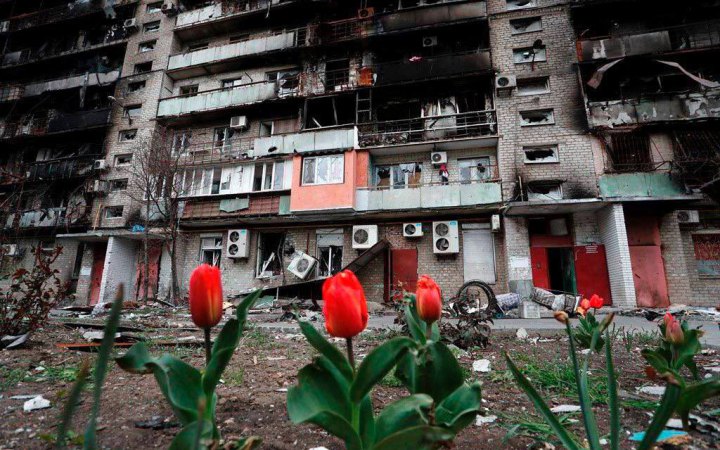14 March. Day 19
Compared to yesterday, today is silence. I went to look at the consequences of the shelling. Two bombs fell at the intersection of Budivelnykiv - Bakhchivanjy. One aimed exactly at the center of the intersection, the other - closer to the stop in the Prymorsky district. It is only 50 meters from us. The funnel is small, but all the houses around it were left without windows, not just without glass, but without windows, sometimes frames were blown away on the other side of the buildings as well. The balconies were torn off, the kiosk near the bus stop was pushed about half a meter from the foundation. Probably, at the moment of the bomb falling the car was driving on the road, I somehow don't want to approach it closer.
While I. and N. are in the basement, I will collect things. It is necessary to move to the Kalmiusk area. Once again I go to S. apartment. He has no windows left on the balcony. I cover the frames with plywood and blankets so that the apartment at least does not seem abandoned. I take everything I need with me. There are still products "from the fridge" on our balcony. It turns out a big, very heavy bag and a huge package. From the food supplies I don't take only potatoes - it does not fit in the car anymore.
I decide to walk around and see which way is better to go. The road through Bakhchivanjy - Nakhimov was cut off. Our intersection is covered with debris, so it is no way I am going there as I can slash my tires there. The only way to go is through Italian street or Myru Avenue through the center or Budivelnykiv Avenue to the north. I move along the avenue towards “1000 trifles”. Across the yard, I see a woman's body covered with a blanket. She cooked over a fire and died. In the distance, two men dig a hole. The same picture is in almost every yard. Corpses lie under houses.
There is a lot of traffic on the avenue. People with carts and packages are heading in different directions. It turns out that the last store - “Mirror” is being looted. The shell hit the warehouse, and through the cargo entrance people take everything they can get their hands on.
There are corpses near the store. These are the ones who went shopping and didn't come back. They were neatly stacked under the wall, forming another line. From the living queue, where they stand for food, any of us can move to the queue of the dead - for burial.
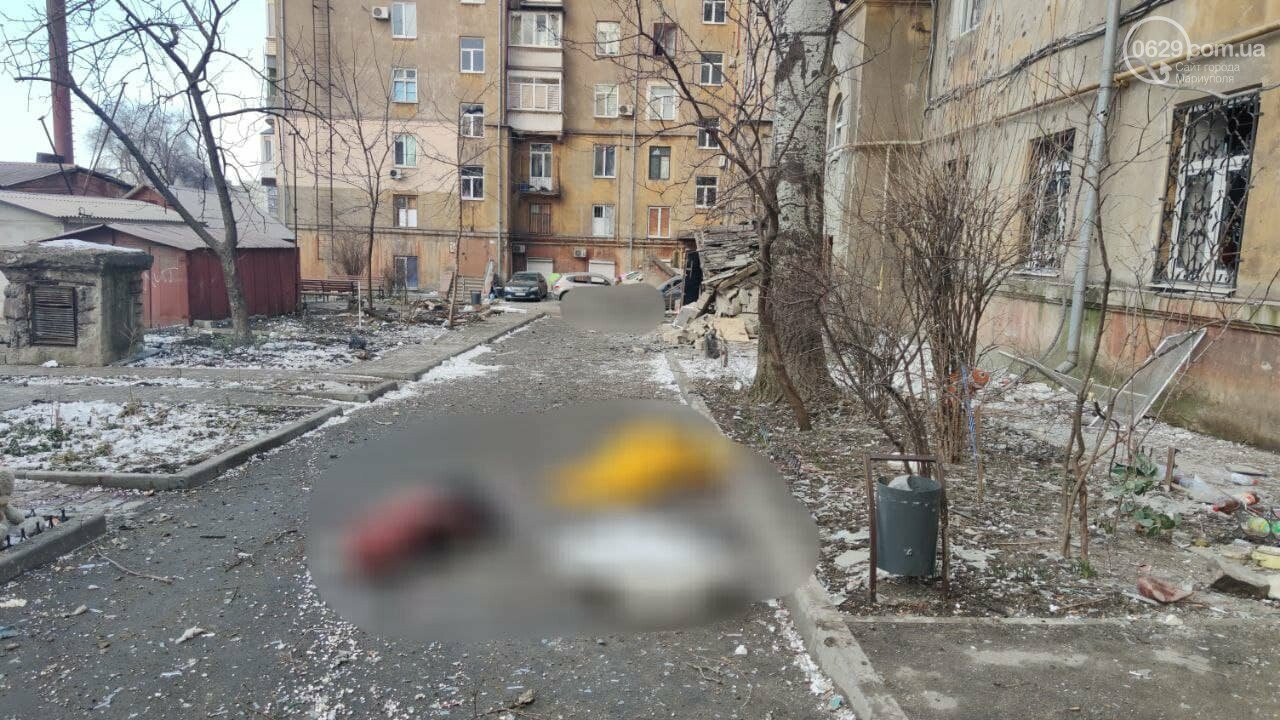
For some reason, I remembered “Snowden's Secret” from the “Trap-22”. If the soul has left the body, then the human body immediately becomes a thing. The dead can be stacked like boxes in a warehouse.
Carefully I reach the crossroads of Budivelnykiv - Myru. Somewhere on the side of Levanevskoho Street explosions are heard and smoke rises. Roads through the center are also cut off - there are fights there. There is only the road to the north - the route you want to go the least. According to rumors, the area is already occupied, and crossing the line of contact is a bad idea. We will have to wait.
At the entrance, O. says that he managed to take out of “Mirror” store a bag, two boxes of already thawed pies, margarine, and several bottles of alcohol. There was something inedible in the bag. We are frying the pies on the fire for several hours. Part - with cheese and spinach, the other - with some jam. They have already become a mess. However, this is hot food, enough for the whole block of apartments, and little of it is left for tomorrow.
A grandfather in a baseball cap with a Greek flag brought a camera - they took a group photo with the neighbors. Symbolic nonsense.
Towards evening he talked to A., who lives downstairs. His house on Kuprina Street burned down completely. He went to see it and talked to the locals. The occupiers shot at the building from the west and our troops from the east. They discussed how to deal with the fact that civilians are actually suffering from the fire of both sides. A sharp question, but the conversation turned out to be very balanced and moderate. When you remember who is the invader and who is the defender, everything falls into place. If Putin's russia had not launched an operation to liberate unclear who and from whom, nothing would have happened.
After five o'clock, a mortar fire went through the streets. I had to go to the basement earlier than usual.
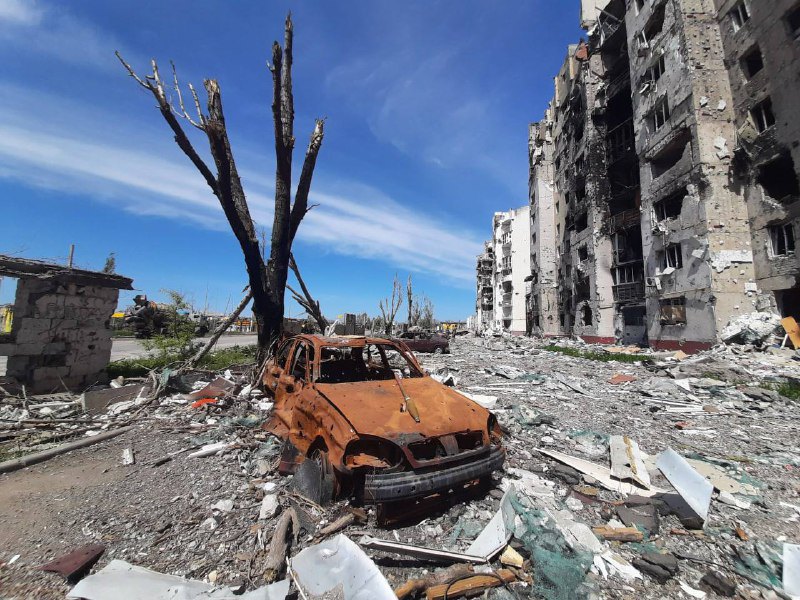
15 March. Day 20
In the morning there is a family scandal in the vault. A guy tells his wife that people go from Mariupol through the Primorsky district. He has no specific information but insists that it is necessary to go. His wife is hysterical. She is afraid for herself and the child. Going into the unknown is a big risk. However, staying here is also becoming more dangerous every day. The next bomb could hit the house and bury anyone hiding in the basement. The day before yesterday, they were separated from this only by some meters.
I go to the apartment to collect things. As soon as the situation allows, we go to the Kalmius district. The main bag - with food. Documents and money - in a backpack with you. Clothes and other things are at a minimum. Besides that - N`s suitcase, nothing else will fit. I check not to forget anything important.
I have three more sports jackets under my winter jacket, and in the pocket of the one closest to my body, I find the three thousand UAH I withdrew from the ATM back in February. The change of values happened quickly. What you have turns out to be unnecessary during the war. And you don't have what you need.
It is a pity that we did not have a power bank, a lantern, a water filter, and food supplies. Autonomous resources are life. A. from the ground floor with his solar-powered phone charger looks like Elon Musk among the savages.
My attention is drawn to a white minivan standing with the door open next door. People download some things. I approach the driver with a question about where he is from and where he is going, maybe he heard something about a situation in the Kalmius area. He replies that he came from Melekino through the village Moryakiv. The checkpoint was destroyed, no one is there. He also adds that yesterday and the day before yesterday convoys of private cars left for Zaporizhzhia. The decision matures instantly - we have to go. I quickly say to I., that he has to go to the basement to N. and immediately gather their things. I go to the neighbors who have cars. You need to gather at least a small column to go together. O. on the Mazda does not hesitate. S. at KIA as well. Another uncle will go with us in the van. He goes to the minivan to question the guy again. He crumples for a long time and finally refuses. We will go in three cars.
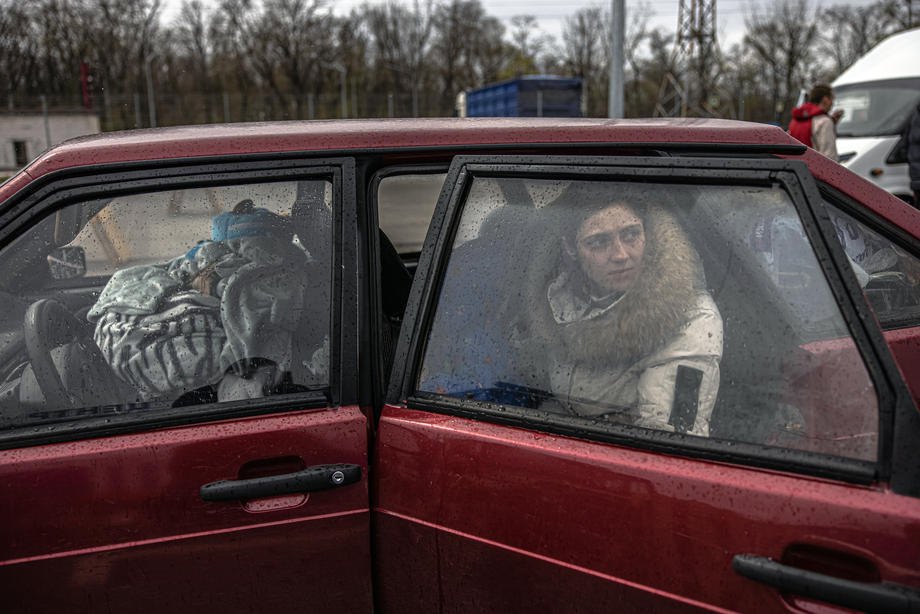
Warming up the engines. I have to start my car with a push - the battery has died. Everything needs to be done very quickly. Calm time can end at any moment. It's 9:30, we leave at 10:00.
The five of us get in the car again. We go first because S. and O. do not know this area. We go through Budivelnykiv Avenue, down to Lunin street. We see damaged and burned houses on the way. Buildings near the intersection with Lavytskyi were severely damaged. You need to get to the village Moryakiv through the uprise near Torgmortrans because the Gagarin street is blocked by barricades. We pass the “arrow”, TFD and after the power plant we rest on the tail of the column. Hundreds of cars, all standing. What's next? Why don't we move? No one knows.
Along the column, a man sends a message that the white rags should be removed from the cars, and the words "Children" should be left. From time to time, cars with the military drive on the opposite side. Planes can be heard in the sky, exploding somewhere. We stand under the fence of the port, around a funnel with the debris of mines and “hail”. Incoming could hit here at any moment. The situation is tense.
The queue is moving very slowly. Maybe there is a check at some checkpoint over there?
Finally, we turn to the rise of Azovska Street. It`s a traffic jam here. Quite a steep slope, almost no road. The queue moves several meters, and cars are constantly stuck or stuck. How good that I have a supply of gasoline! How much fuel will we spend on this hill? The computer shows the figure of 21 liters per 100 km! The right wheel falls into a hole with sand, we can not move. Drivers from the lower cars quickly jump out and push up those in front. Nobody wants to stay here. At one of these stops, I meet O.G., a colleague from the football club. Don`t have time for a long conversation. Briefly, who heard what, who saw what - and back to the cars. Towards the end of the ascent, Red Cross jeeps entered the oncoming lane, followed by private cars. Someone blocks the road - a verbal fight begins. Delay again. We have to push that jam manually.
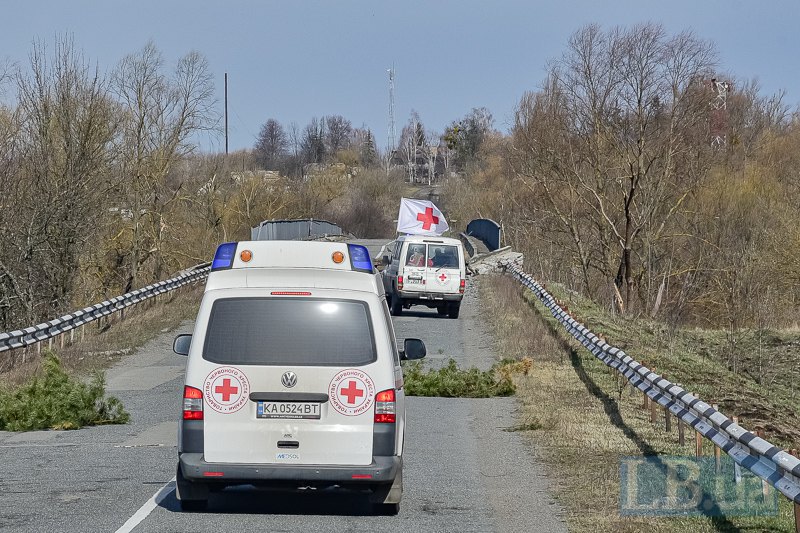
Finally, we go up to the village Moryakiv. Here is another traffic jam - two continuous streams of cars from below and to the right merge into one on a narrow village street. Everyone tries to fit in somehow, there are a lot of glass and fragments of broken bumpers on the curve.
Next on Markelov street past the observation deck and the church. I. recalls that people often came here to admire the scenery and drink coffee. Thoughts say goodbye to this place, such feelings that we will not return here again.
Across a street, in a remote village we turn to the road on Melekine. The houses around us are very destroyed, no people can be seen. The last turn - and we're on our way. Here again, two columns of cars merge into one. But there is a voluntary regulator at this place. A guy in torn pants and a dirty sweater is on duty at ten cars on each side. Thanks to him, we pass the area quickly.
We are approaching the checkpoint. All around in the funnels. A tank and an armored personnel carrier were burned on the roadside. Russian. All buildings are demolished, there are traces of fortifications and, it seems, corpses in the plantations. We pass it very carefully, the whole road is in ruins, after that free. On the left site, the paradrom and the village of Rybatske fly past us, as well as two of our other places for rest. Again that stinging feeling of irreversibility. So many pleasant memories are associated with these places. We stop at the turn to Portivske. O. is already somewhere ahead. S. and I want to find out where to go next. Because one part of the column goes straight to Melekine, the other turns to Mangush. We approach people who have also stopped. They show us an SMS from the SES, where it is written that the evacuation route passes through Mangush. We are surprised! It turns out that an evacuation is scheduled. Who heard about it? Only now are some people in touch. They say that there is no way through Melitopol because the Kadyrovites are furious there. Only through Tokmak, then Vasylivka, Zaporizhia.
In the afternoon we get to Mangush. The village is intact, there are shops. In the center near the castle, a car with the symbols of the DNR brought humanitarian aid, there are not many people. There is a lot of DNR military and police around. Nobody stops us, although we are accompanied by a watchful eye. After the turning ring behind Mangush, the road to the village is familiar. Before Demyanivka, the detour because of the blown-up bridge takes another 40 minutes, and we return to the road at the fork behind Komyshuvaty. On the right is the road to the village, but none of us have any doubts - we need to go further.
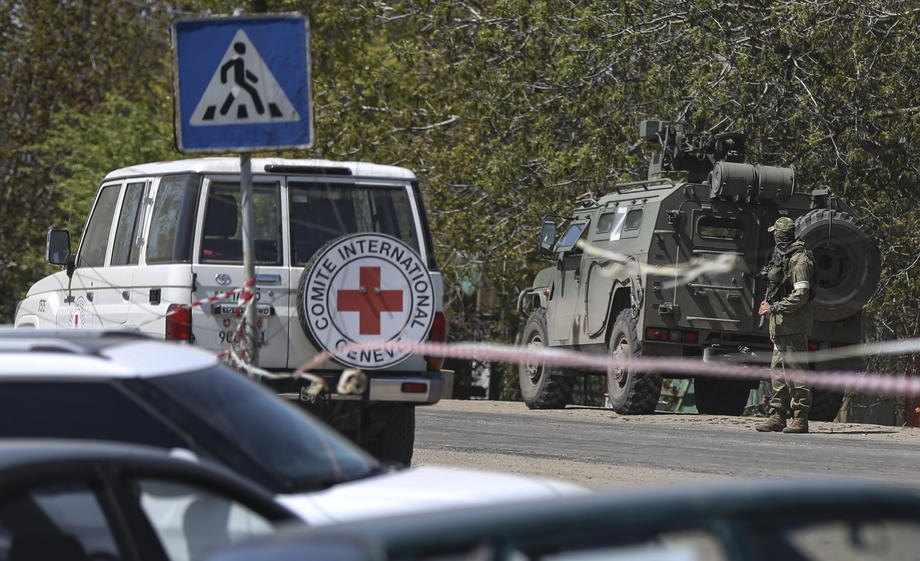
At the crossroads, we see for the first time traces of fighting. One burned armored personnel carrier of the occupiers, several funnels, and fired shell casings. Were there defensive battles on the outskirts of Mariupol? It doesn't look like that yet. We pass the Chervone Pole, turn to Berdyansk. In some places, there are traces of caterpillars and empty boxes of ammunition. There are no burnt equipment or fortifications, the road is clean and free.
A bulldozer burned at the intersection at the entrance to Osipenko, and a Mercedes sedan shot down on the roadside. Then the first checkpoint of the occupiers. There is a huge queue in front of it. The check is formal - they stop, look in the salon, ask - where. There are some reservists and conscripts, or very young guys, or elderly uncles.
We only gain speed as we rest on another tail. Checkpoint again. Now at the fork in front of Novovasylivka. More than a kilometer to the checkpoint. S. says that they will go to Berdyansk because they have relatives there. Goodbye. We go further to Zaporizhzhia.
N. still has a little charge on his phone, I need to look at the map because I don't know how to get to Tokmak highway. An hour later we are at the checkpoint. Almost children again. They are wearing camouflage looking like it just come from the warehouse. On the pants, you can see the folds from the fold, as they lay packed. Here the check is more thorough, they look at the documents. In front is an undressed man, the three soldiers see something on him. The soldier asks me to unlock the trunk, he looks like 20 years old, not older. At the bottom, there is a backpack with photo equipment and a laptop, if they find it, there may be problems. I open the back door, a children's jacket and a package of pasta fall on the asphalt, raisins pour out of the leaky ball, and they hit the road.
- Only personal belongings?
- Yes.
- From Mariupol?
- Yes.
- You are free.
Am I free? Oh, thank you so much, you are being so generous. “Liberation” at every turn. It's hard to hold back and not say it out loud. I can't lock my trunk for a long time, something is constantly interfering, too many things.
Azov ring, another checkpoint. Another hour lost. But from here the turn to Dmytrivka, and this is the route to Tokmak. The sun is already setting. The road is nice, you can go fast. I hope we will soon get to the controlled territory, and we will get to Zaporizhzhia before the dark. This thought makes me calmer. We pass the villages of Pidhirne, Zelenivka, and Krasne: we see Ukrainian flags everywhere on the buildings, but behind them, there are russian checkpoints. Each time the thought - finally left - then each time disappointment. At the posts, the occupiers wave their hands and shout: “Close the window, the child will catch a cold.”
In Zelenyi Yar, the russians are standing against the background of the inscription “russian warship, go f@ck yourself.” The shot is just fantastic. Here I understand that all this time I have a registrar working.
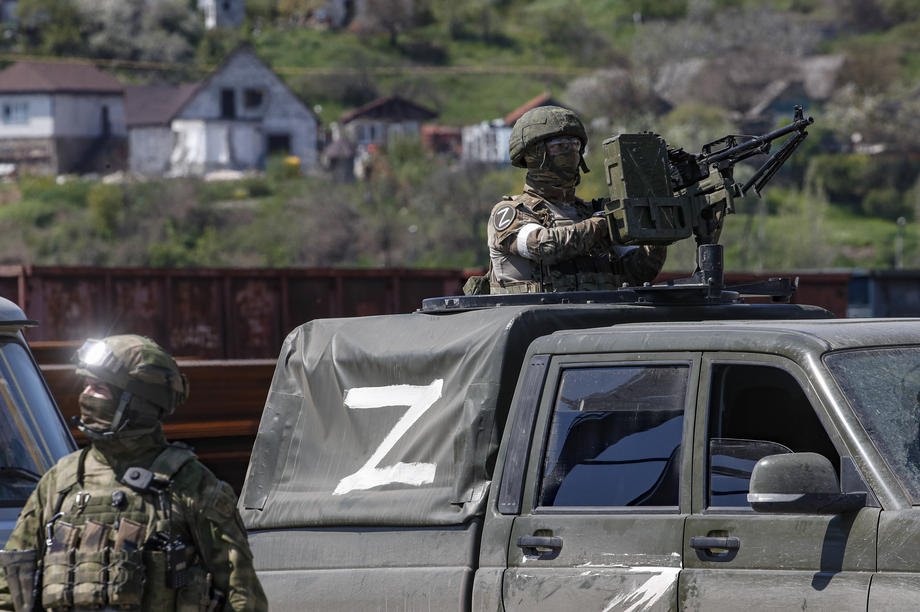
The next stop is Tokmak. Well, our troops must be there for sure. And again no. At the entrance, we are greeted by occupation posts with the words “Vostok-Mozdok” on the armor. The Caucasian speaks something in broken russian, which I understand barely. It is almost dark. Are we not going to reach Ukrainian territory today? We pass Tokmak, then to Vasylivka. Already in the dark, we stand in line at the checkpoint near Vasylivka. I can't even guess whose it is. Did the occupiers go that far? Vasylivka is almost near Zaporizhia, about 40 km. We did not see any traces of clashes all the way from Dmytrivka to Tokmak. How can this be? “Kamazes” with the letter “Z” on boards are rushing past us. Everything is clear. There is also traffic on field roads. Obviously, this is not the forefront. Is Zaporizhzhia Ukrainian at all? These thoughts make me nervous. It's getting dark.
We get to Vasylivka when the night is opaque. There is no light in the city. The streets are dark and dead, with no signs of human presence. This picture is scary. Somewhere in the dark I get on the wrong road - and we find ourselves outside the column. This is very bad. We can go somewhere wrong, and we are simply shot without warning. I return carefully. With relief I see the cars, rejoining the column of three cars. Ahead is the intermittent light of a lantern - again a checkpoint. Russian soldiers explain to us that Ukrainian positions are ahead, in Kamyanets. But admission is carried out only until curfew. After 18:00 entry is prohibited. So we can stay in Vasylivka or go further and wait for the morning there. I hope that if an official evacuation is announced, people will be allowed to pass, despite the curfew. Besides, we have no idea where to stay in Vasylivka. No one is left, everyone is moving on, although moving between military positions at night is a crazy risk.
Somewhere a few kilometers after Vasylivka we get to the area where the fighting took place. Everywhere is a large number of burned equipment of the occupiers. They were waiting here, you can see at once. Not getting into the wreckage is quite a difficult task. All around is complete darkness, the car lights illuminate these silhouettes suddenly when they are already 10-20 meters away.
It is extremely important not to puncture the tires. Changing the spare wheel here is another pleasure, but what if you break both? Sometimes you have to go along the roadside. What are the surprises left there? It seems that I. is telling me something, but I do not understand. 100% attention to the road, you do not hear or see anything else.
In front is a tank that froze. The explosion threw him up, and he seemed to crash to the ground. It is difficult to understand how this is possible. Torn in half and opened from the inside, like eggs from which monsters were born - this is what armored vehicles weighing tens of tons look like. These horribly monstrous paintings emerge in the headlights like a moving exhibition, for a moment - and everything disappears as if it never existed. Imagination scrolls over and over again. I do not notice how we stand in the tail of another queue, everyone in the car is silent.
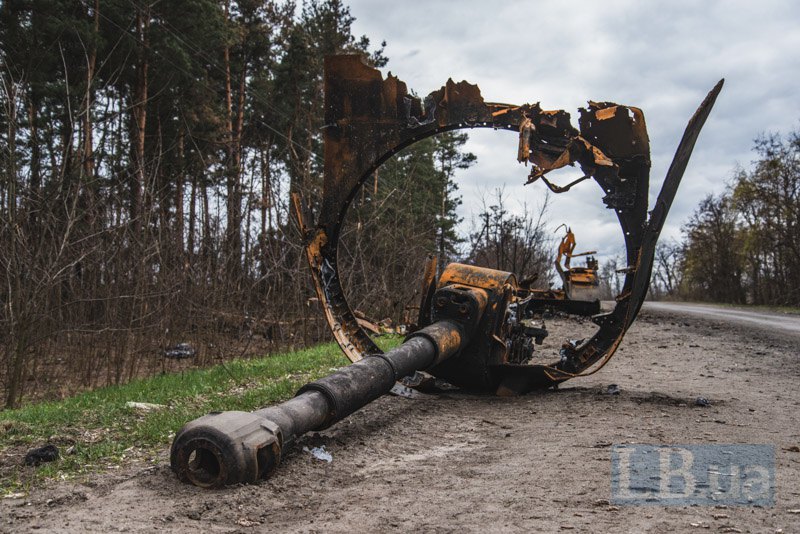
Ahead of us they shut down the engines. I'm trying to find out why. In the car in front of us is a guy in a jacket of FC “Mariupol.” He says that he hid at our base for some time, and got dressed there. I learn from him that the area in front is mined. In the morning a military leader will arrive, and we will follow him to not to explode. I look around - the beginning of the column is somewhere far ahead, and the tail stretches far back. So, today we will not go further. We will have to spend the night here, in the middle of the route, between the positions of Ukrainian and russian troops. You can't think of anything better. It's ten o'clock, at least seven o'clock before dawn. It's getting colder, minus five degrees.
The night is dark, and there is no moon, so the stars are very beautiful. But you can't admire the sky, there are special effects on earth. On both sides of the road, we see the launches of hail and some single missiles. Like meteorites, tracers fly in different directions.
Do the soldiers in the positions know that hundreds of cars with thousands of people are stuck here on the road? Unlikely. Seven hours in a row in intense anticipation of a random bullet, mine, rocket. I did not feel so helpless even in Mariupol. We stand here like figures in a shooting gallery. There has never been a more horrible night in my life. I started the car three times to warm up the cabin because we were already starting to shake from the cold. But you need to save gasoline, even though it is very cold. The cat climbed under my jacket and did not get out all night: I warmed him, and he warmed me. Did I sleep? It seems so, but I'm not sure.
Dawn met with eyes wide open. As soon as it became clear, I went out to squat to warm up and to learn something. Went to the beginning of the column. Ahead I see O. on “Mazda.” What a meeting! The information is the same. We are waiting for sappers from the Armed Forces. Ahead of us, there is a bridge. At the head of the column is a Red Cross van, there is KB in it, who is familiar to me from Mariupol. The information is correct - we are waiting for a man who will lead the column around through the Lugove. During the conversation, some cars start moving along the route in the direction of Zaporizhzhia. With K.B. we follow them with our eyes.
“Crazy,” he says. After everything we've been through, I don't see anything extraordinary in this.
I see that the first cars happily got to the other side of the bridge - so we can go. I return quickly and we follow. There is no desire to stay on the front line for an unknown period of time.
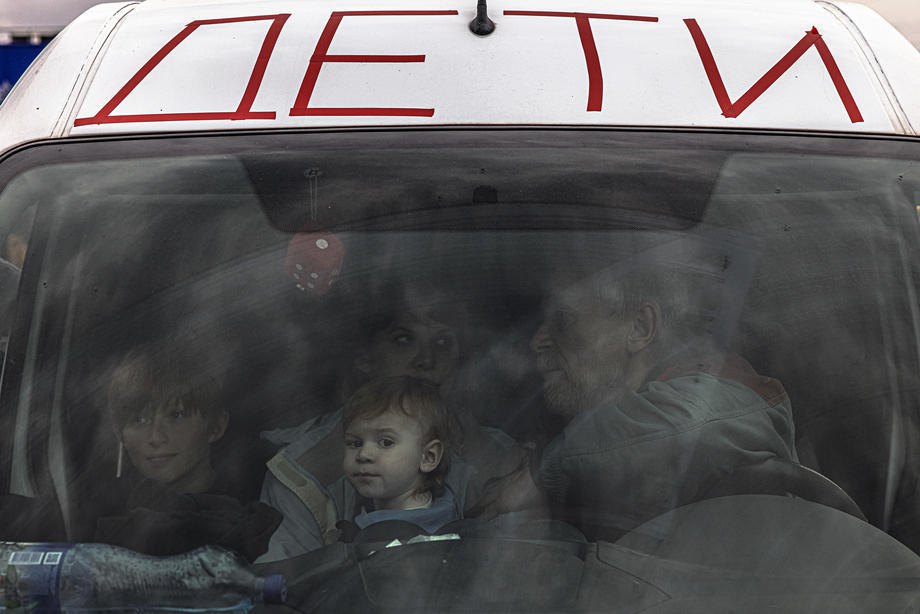
Near the bridge, an uncle hurriedly shouted in the window: “Keep a distance of at least 10 meters between cars, do not hit mines. Very carefully!” I am approaching the bridge, sandbags are stacked on it in a checkerboard pattern. Behind them, in piles of four or five, are anti-tank mines, with wires stretching from them. Holding my breath, I pass these barriers and exhale on the other side of the bridge.
A short stretch of the road - and we are almost in Kamenske. The bridge in front of the village was blown up. The column turned right, we will do a detour through some hamlet. The road here is very narrow and jagged. We are barely moving. We stop again on the hill. It is reported from the front, that the head of the column faced the Ukrainian checkpoint. The military said it was necessary to wait for a police convoy. It will take us to Zaporizhzhia. Another hour and a half of waiting. During this time in the column, I meet familiar football players from the youth teams. They said that they stayed in the dormitory alone, facing all the problems. There was no planned evacuation, they survived thanks to the commandant. Some managed to leave with an amateur team, but not all of them. Finally, we continue to move.
In Kamensky, without stopping, we pass the first Ukrainian checkpoint. Fortifications, trenches, and DOTs are everywhere on the route. The first check of documents is somewhere further. According to the meter, there will be enough gasoline for another 100 km. How good that I had a reserve. Because it turns out that this trip took almost twice as much fuel as usual.
It was not far from Zaporizhzhia when we turned right onto some rural roads. Again, we barely move, we often stop. Many are running out of gas. People pour from one gas tank to another just on the road. Some are pulled on ropes.
A few more detours through the villages. There seems to be no end to our journey. I no longer understand where we are. We wander until I have a signal - “low fuel.” It is unknown how much more to go. Well, at least we've already got to Ukrainian territory. But here I see the familiar places - the regional hospital. We arrived. It turns out that we will get to Zaporizhzhia by the Mariupol road. The convoy takes us to the Metro, where there is a refugee registration point.
Finally, we are in civilization. There are people around, some organized activities, cars and city buses drive on the roads. The connection was established, so messages and calls began to arrive. Only now do I realize how exhausted I am, but it's too early to relax. I. goes to get tea, I stuff myself with an ugly, fried cake from the “Mirror” store from the day before yesterday. I quickly register and go to the Metro toilet. The jet of hot water caused a forgotten feeling of warmth. A stranger looks at me from the mirror above the sink: ugly horn-rimmed spectacles, a gray, plastered face, dirty burnt clothes, and a shaggy beard. The queue for the sink behind me brings me out of a long stupor. We need to move on.
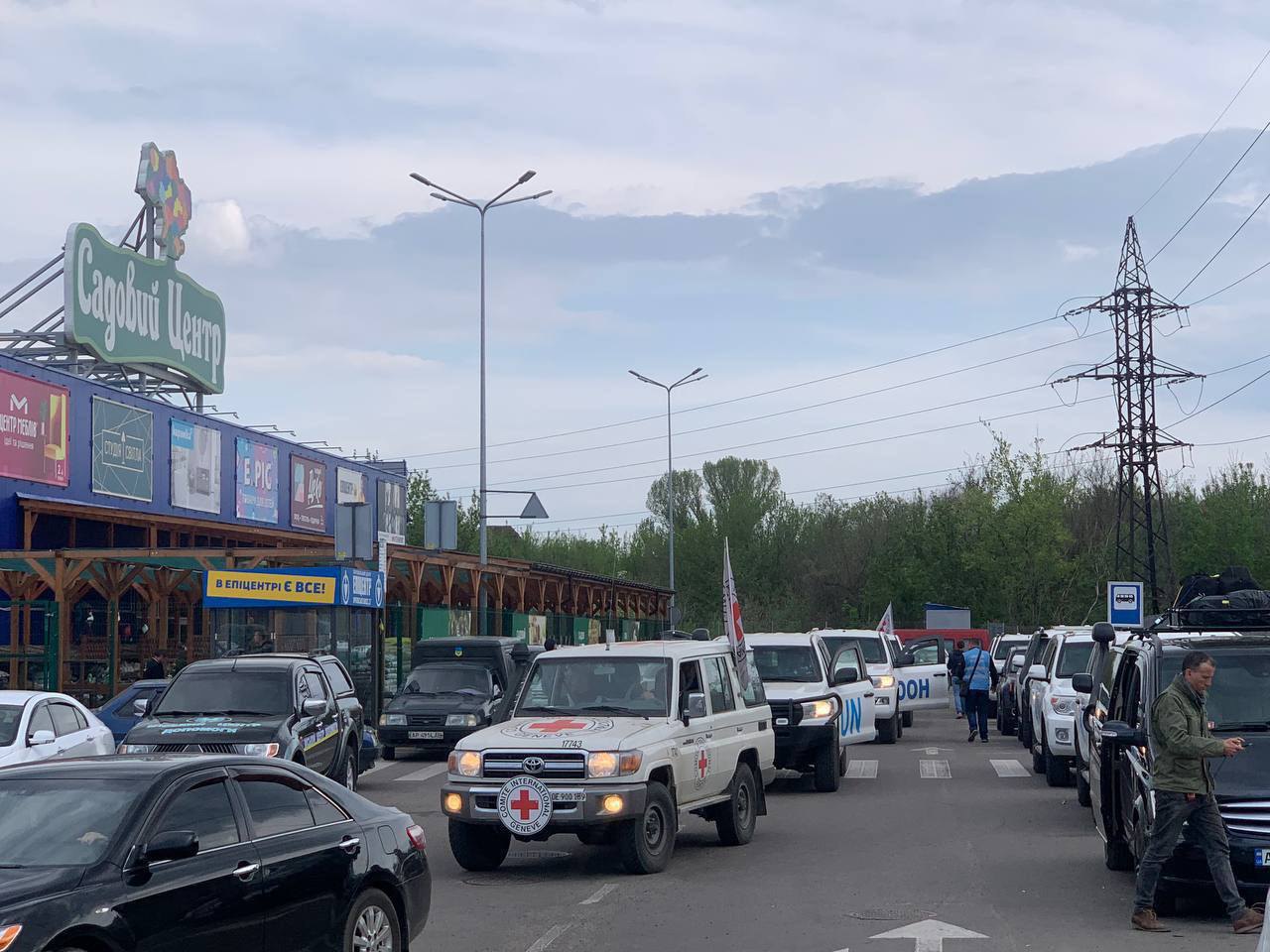
Epilogue
Sometime in late March, we learned that our house had been almost completely destroyed and that the apartment had burned down completely. Later, photos and video evidence appeared. Surprisingly, I was personally relieved that my belongings would not go to the marauders and that the “liberators” would not live in the apartment. All the family and close friends got out of that hell, and the last physical ties with Mariupol burned in the flames. At one point, the city became a symbol for me of the terrible tragedy to which my past life is now connected. This past is constantly made known by the voice in the handset: “Now your contact is out of range,” random flashbacks and messages about the death or happy escape of friends. Will I miss my home? Of course I will. All my future life I will sadly remember Mariupol and the happy years spent there. Do I want to go back? It seems to me that at present the return can only be said hypothetically, just as the return of Crimea and Donetsk has been talked about for the last eight years.








